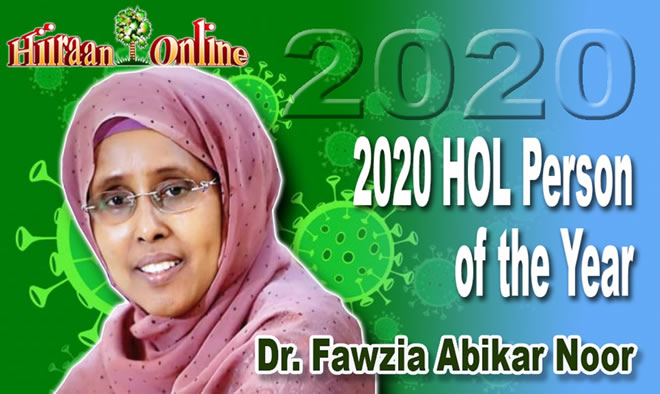

Hiiraan Online Editorial
Monday, January 11, 2021
The HOL Editorial Board and
Amin Arts have unanimously chosen Health Minister Dr. Fawzia Abikar as the 2020
Person of Year.
The decision to recognize Dr.
Abikar for this commendation is objectively informed by her exemplary
performance in response to the COVID-19 pandemic. The COVID-19 epidemic has
ravaged nations the world over both physically and financially. That disease
has left close to two (2) million people dead and has infected another 90
million. The economic cost is yet to be tallied, but the World Economic Forum
estimates it to be between $8.1 and $15.8 trillion globally.
Dr. Abikar was born in Jowhar
in the Middle Shabelle region, where she pursued her primary and secondary
education before joining the Somali National University for her A-Levels. She
would later earn a master’s degree in Health Services Management from the
Instituto Superiore di Sanita’ in Rome and completed a Ph.D. in Public Health
from l’Universita’ Degli Studi di Roma, “La Sapienza.”
She worked in Somalia and
Italy before being appointed Health Minister of Somalia’s Federal Government in
2017.
Dr. Abikar has established a
remarkable record in transforming the health sector in Somalia. Among her
achievements as minister was the drafting and passage of the National Health
Professionals Law and the Universal Health Coverage launch. She also led and
oversaw the takeover and management of Benadir and De Martino Hospitals, both
of which have 700 staff by the Federal Government.
It was not without its
difficulties. The COVID hospital in Mogadishu lacked essential equipment like
an ICU, and securing oxygen proved to be a difficult problem for doctors and
nurses.
Through her steady leadership,
Somalia regained its status at the World Health Organisation (WHO) in 2017.
Dr. Abikar was awarded the
prestigious Minerva Award for her contribution as a role model in ‘promoting
positive values and knowledge'.
When the first case of
COVID-19 was reported in Somalia on March 16th, there was heightened fear
locally and international partners on how the Horn of Africa nation would
handle it. With a weak healthcare system, absence of social safety nets, and a
dismally performing economy, Somalia was indeed seen as precariously exposed to
the impact of the pandemic. Coupled with these, the devastating food
destruction by desert locusts and floods had displaced thousands and robbed
them of livelihoods.
Somalia was staring at a
-triple-threat on top of already existing state rebuilding challenges. There
was a need to respond in a coordinated and transparent manner to stem the tide
of COVID-19, which pushed the few available health facilities to the brink in
the first few months of arrival. Though the response was inter-ministerial and
inter-governmental, the bulk of the mission fell on the Federal Health
Minister’s shoulder.
On the Ministry of Health’s
advice, local and international flights were banned, cutting off imports and
taming local spread of the virus. This was followed by the closure of all
learning institutions and implementing stringent health measures such as
hand-washing, social distancing and public messaging on protection from the
virus.
Dr. Abikar’s Ministry employed
an existing network of polio outreach workers in Somalia that fanned the
country to educate people about the virus and protection against it. These
workers were responsible for identifying nearly half of Somalia’s 4,690
infections, according to the WHO.
COVID-19 FUNDS
Like many developing
countries, Somalia received donations from the WHO and various countries to
help the government respond to the pandemic. And as has been reported in other
countries, the funds attracted senior government officials and politicians’
gluttony and selfishness.
She managed to navigate
through the internal hurdles meted out against her Ministry while at the same
time handling the enormous task of preventing the spread of the disease. The daunting task of combating a new virus, alien
to the whole globe, coupled with Somalia’s weak state institution, proved
tremendously challenging for the Minister and her Ministry.
In Somalia, then Prime
Minister Hassan Khaire sought to have the COVID-19 purse under his office. and
there were fears the funds would find ways into the unscrupulous hands of those
within the OPM. However, the Health Minister vigorously fought against the
move, without which the ministry would be relegated to announcing COVID-19
results. She managed to navigate through the internal hurdles meted out against
her Ministry while at the same time handling the enormous task of preventing
the spread of the disease. The daunting
task of combating a new virus, alien to the whole globe, coupled with Somalia’s
weak state institution, proved tremendously challenging for the Minister and
her Ministry.
The minister remained
steadfast in the wake of corruption allegations against some senior officials
in her Ministry who were subsequently jailed.
To date, though COVID-19
remains a threat to the country, the number of cases has not gone up
significantly as was the case in the first few months. As of November 25th,
there were a total of 4,451 infections with 3,417 recoveries. The number of
people who have died as a result of the disease is 113.
In her next act, Dr. Fowzia
Abikar is tasked with ensuring that Somalia is not left behind in the race for
COVID-19 vaccines. The health ministry is expecting the first doses to arrive
sometime within the first quarter of 2021. In addition to that, she must also
ensure that vaccination drives for other infectious diseases like polio or
measles are not side-lined.
The prudent utilization and
management of donor funds by the Ministry of Health ensured that several
medical facilities in the country were able to handle COVID-19 cases.
Therefore, it is against this
backdrop that Hiiraan Online (HOL) Editorial Board, jointly with Amin Arts,
found it befitting to honour Dr. Abikar as the HOL and Amin Arts 2020 Person of
Year.
